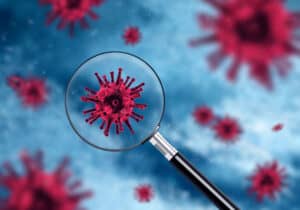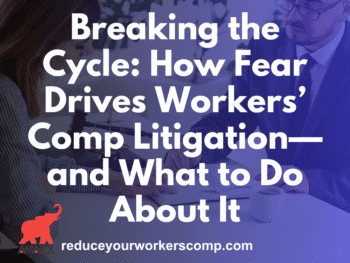
Notwithstanding the near ironclad nature of COVID-19 presumptions in workers’ compensation, there is an opportunity for members of the claim manamgnet team to diligently investigate claims and only challenge these that create a valid opportunity for a dispute. Claims teams can also educate their clients to ensure all efforts are being undertaken to drive down daily infection rates and create a healthy workforce.
Click Link to Access Free PDF Download
“Avoid the 3 Primary Reasons Injured Workers’ Hire Attorneys”
Understanding Statutory Presumptions
Prior to COVID-19, “ordinary diseases” of life to which the public is equally exposed outside of employment were generally not considered to be compensable under workers’ compensation. Examples of this would include someone suffering from a severe cold or influenzas strain that impacted many people working in the same proximity. Things changed in early 2020 when state lawmakers sought to assist person’s working certain jobs obtain a statutory presumption. Commonly held positions included:
- Firefighters, paramedics, nurses and other health care workers, and correctional officers
- Health care professionals such as emergency medical technicians, doctors, and nurses; and
- Anyone working in an environment that had direct contact with COVID-19 patient care or other ancillary work.
Under this new statutory framework, the defined employee’s contracting COVID-19 would be presumed to have contracted the virus at work and entitled to workers’ compensation benefits. These presumptions allowed for rebuttal if the employer and insurer demonstrated the employee was not a direct cause of the disease.
Dealing with Statutory Presumptions
It is nearly impossible to rebut this presumption given the many complexities of our modern society. Having confirmation of direct exposure to a person with the condition, or like hood of exposure is enough to ensure compensability. Given this conundrum, proactive claim handlers and stakeholders should evaluate each claim and determine if there is enough evidence to succeed in disputing the claim. Factors to consider can include:
- Evidence the employee was in fact exposed to someone with COVID-19, or someone with COVID-19 was likely within the given workplace; and
- Assess the likelihood of other sources of COVID-19 transmission. Examples of this could include information on the person attending a large gathering such as a sporting event. Inquiry can also include an examination of periods of paid time off and whether the employee was able to have contracted the virus prior to re-entering the workplace.
- Attempt to conduct contact tracing that may help determine the source. Getting the employee’s cooperation on such efforts may be limited.
Employers should encourage all employees to report their illness as soon as possible. Delayed reporting of the illness can serve as other lines of inquiry when investigating the claim. Members of the claim management team should never merely accept a claim and accept primary liability. There should be a diligent investigation on the claim and make the right determination.
Investigation Tips and COIVD-19 Presumptions
Members of the claim management team need to be proactive when it comes to investigating claims of COIVD-19 exposure and determinations whether statutory presumptions apply. Investigation needs to include the following:
- Know the law and elements required for the presumption to apply. Presumptions vary in terms of occupations covered, and requirements regarding confirmed exposure within the workplace. When in doubt, contact a defense attorney.
- Obtain information regarding the employee’s work activities. Know detailed information about the setting they work in – eg – inside; outside; ventilation and windows, etc. It is also important to know the names of co-workers and others whom they were in contact. These are important details to ask during a recorded statement.
- Know exact details on the employee’s personal life and activities. Important information to gather should include their daily routine, when/where they go shopping, events they attend during the probable exposure period, and the activities and interactions of family members. Examples of this can include schools’ children attend and exposure rates at those institutions.
Details are important and key when it comes to this type of investigation. Never engage in unnecessary or vexatious litigation concerning these claims.
Conclusions
COVID-19 will continue to impact the workplace and issues related to workers’ compensation in the coming year. Now is the time to be aware of statutory presumptions and understand how they work and how to investigate when challenging it. Any COVID-19 claims require the claim handler to be complete and thorough when conducting their investigation.
 Author Michael Stack, CEO Amaxx LLC. He is an expert in workers’ compensation cost containment systems and helps employers reduce their workers’ comp costs by 20% to 50%. He works as a consultant to large and mid-market clients, is a co-author of Your Ultimate Guide To Mastering Workers Comp Costs, a comprehensive step-by-step manual of cost containment strategies based on hands-on field experience, and is the founder & lead trainer of Amaxx Workers’ Comp Training Center, which offers the Certified Master of Workers’ Compensation national designation.
Author Michael Stack, CEO Amaxx LLC. He is an expert in workers’ compensation cost containment systems and helps employers reduce their workers’ comp costs by 20% to 50%. He works as a consultant to large and mid-market clients, is a co-author of Your Ultimate Guide To Mastering Workers Comp Costs, a comprehensive step-by-step manual of cost containment strategies based on hands-on field experience, and is the founder & lead trainer of Amaxx Workers’ Comp Training Center, which offers the Certified Master of Workers’ Compensation national designation.
Contact: mstack@reduceyourworkerscomp.com.
Workers’ Comp Roundup Blog: http://blog.reduceyourworkerscomp.com/
©2021 Amaxx LLC. All rights reserved under International Copyright Law.
Do not use this information without independent verification. All state laws vary. You should consult with your insurance broker, attorney, or qualified professional.





























